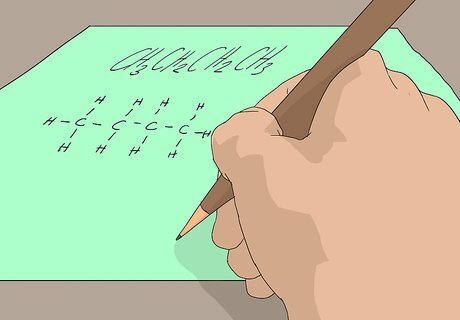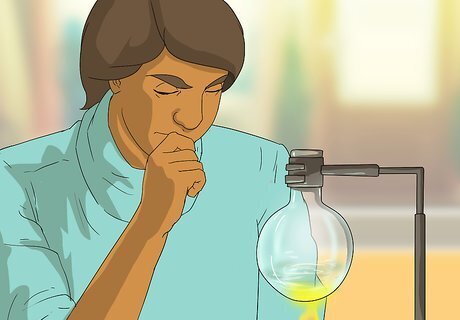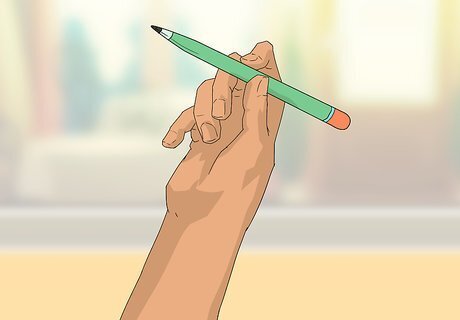
views
X
Trustworthy Source
American Chemical Society
Scientific society for those involved with chemistry and publisher of several leading peer-reviewed scientific journals
Go to source
Most of the compounds studied in organic chemistry contain at least one carbon-hydrogen bond. While organic chemistry can be very difficult, you can make it easier with some basic strategies such as knowing the types of reactions and how they occur and using a 3D modeling kit to work out the chemical structures. There are several occupations that require knowledge of organic chemistry, including doctors, forensic scientists, pharmacologists, and chemical engineers.
Studying Organic Chemistry

Actively review your notes and textbook. Reading through your notes is definitely a good place to start, but actively reviewing your notes is even better. Rewrite your notes and summarize the material. Draw concept maps or visual summaries to illustrate how everything works together. When you come across a compound, draw the structure for it. Read through the notes before class every day so that you will know what is coming up.

Ask for help. Your professor and teaching assistants will have office hours that are specifically available for students to ask questions and get help with the material. Take advantage of this time and actually go ask for assistance. They are there to help you learn and this is an opportunity to ask questions you might have been afraid to ask in class. Getting extra help from a one-on-one tutor can also be beneficial if you are really struggling.

Number your carbons. When answering questions for homework or on an exam, it is easy to lose track of the number of carbons. The number of carbons in the products should always equal the number of carbons in the reactants. You don’t have to number the carbons for proper labeling, just number them so you know how many there are and you can put them in the correct position in the products.

Recognize the relationships between properties. Organic chemistry relies heavily on understanding how different molecules relate to each other. While there is rote memorization involved, it is much more important that you understand the concepts behind these basic interactions than simply memorizing what the interactions are. To name a few examples: As the pKa of an acid increases, the stability of the conjugate base increases. As the polarity of a molecule increases, the boiling point increases. When you increase the chain length of a hydrocarbon, the boiling point increases.

Use modeling kits. Modeling kits allow you to build chemical structures in three dimensions. Being able to visualize the structure can help you understand a compound better than just looking at the 2D version written on the board. The modeling kit helps you avoid mistakes when answering questions on exams and homework.

Use reaction maps for synthesis problems. Reaction maps allow you to visualize all of the functional groups and the reactions that occur to produce them. You can use the reaction maps to string together reactions to get from one compound to the final compound. Once you have identified the functional groups in the reaction, work the problem backwards (from product to reactant) using the maps as a guide.
Developing Essential Study Skills

Do practice problems. The number one way to study organic chemistry is by doing practice problems. The more problems you do, the better your understanding will be. Once you have mastered one concept, move on to problems that are more difficult. Do a set of practice problems from your book every day to keep up with the material.

Make flashcards. Organic chemistry is all about learning chemical structures and reactions. There is also a lot of vocabulary that is specific to the subject. It is very difficult to understand the material if you don’t know what all of the words mean. Use flashcards to help you learn the vocabulary. Once you have mastered the vocabulary, make new flashcards for reactions and structures.

Form a study group. Study groups are a great way to check your understanding and gain new insight into the material. When explaining a concept to others, you may realize that there is something you were missing. This can lead to a deeper understanding of the material itself. At the same time, other members of the group can help you learn concepts that are difficult for you. Choose study partners that learn at the same rate you do. If the group is too fast or too slow for you, it won’t be as beneficial.

Write in pen. When using a pencil, it is easy to just write everything down, erase, and then keep writing more. When you use a pen, you have to think through the material critically before writing anything down to avoid having to scribble things out. While this may not work for everyone, it is good to try it out and see if it helps you think ideas through properly before writing them down.

Study every day. Studying for an hour or two each day is a much better use of your time than trying to study for 5+ hours all at once. With smaller, more frequent study sessions, you can focus on individual concepts and not burn yourself out trying to cram all of the information into your brain at once. Break up your studying into large and small blocks of time. If you only have ten minutes, flip through some flashcards. If you have an hour or two, do practice problems.

Attend class. This may seem obvious, but a lot of effort put into learning material is just about showing up to class. Paying attention in class and taking relevant notes is also necessary. Be strategic about note-taking. Don’t take notes just to take notes. Listen to what the professor is saying and then summarize the information in your notes. If something you wrote during class doesn’t make sense, attend office hours to ask for clarification. Ask your professor for permission to record class lectures so you can listen to them again if you are having difficulty.

Get proper sleep, exercise, and nutrition. The key to success when studying any subject is to maintain your health. Getting the proper amount of sleep, exercising a few times a week, and keeping a nutritious diet are all necessary to keeping yourself healthy and ready for work. Doing these three things will help keep your energy up and help you maintain the information that you are learning. Try to get at least 7-8 hours of sleep each night. Make time for exercise, even if it’s just a walk with a friend. Make an effort to eat more fruits and vegetables and stay away from sodas and excess caffeine.

Set up a good study space. Choose a study space that works best for you. Do you get more done when there’s absolute silence or when there’s a little bit of background noise? A good study space has plenty of lighting, is a comfortable temperature, has minimal distractions, and is comfortable, but not too comfortable. Make sure you have plenty of space to spread out. Keep your study space stocked with everything you will need (paper, calculator, scissors, snacks, etc.) so you won’t have to go hunting and get distracted.

















Comments
0 comment